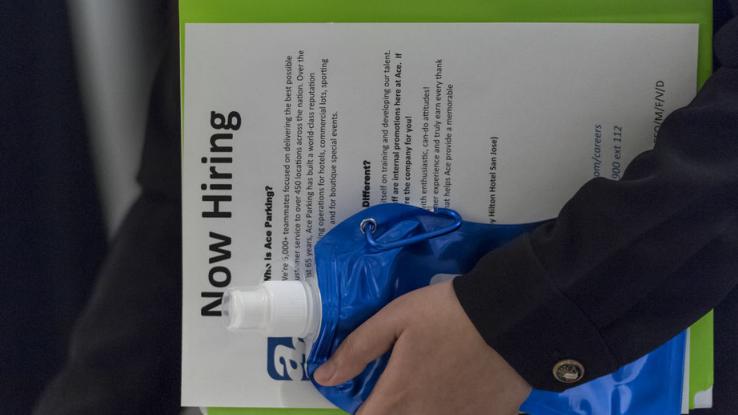
On the night of my 20th birthday, I started a new summer job. I worked the third shift five nights a week helping to remodel a superstore. That summer, I learned a lot about the ways businesses are run and the different work styles people have. Thanks to this work, opening my wallet at the gas station wasn’t as big of a pain as it could’ve been, either. But I was also left desiring more in a few ways.
Soon after starting, I also learned that a “temp” was a person, “temping” was a verb and the company employing me was called a “temp agency.” Temporary employment agencies, I knew from then onward, are a unique type of staffing organization.
Today, the United States is struggling with a labor shortage and an unemployment crisis at the same time — while also attempting to move forward during a global pandemic. Higher wages and signing bonuses are becoming more common as companies struggle to find and retain employees. At the same time, the employment market can be so confusing to navigate that having someone to find jobs for you sounds almost too good to be true. But, that’s what temporary employment agencies offer. The agents find work for you — so long as you’re willing to play by their rules.
Temporary employment agencies can vary depending on what type of work you’re looking for, your individual needs and where you live. If you sampled a group of adults, their opinions of temp agencies might come up mixed. My experience with temp agencies across 10 years wasn’t negative, but I can see where they’re coming from on all sides.
Temp agencies can help in a financial crunch. A temporary staffing agency can offer flexibility, valuable job experience and help securing a better financial future. But, temp staffing agencies seem to be more of a quick fix and help perpetuate a system that doesn’t work for everyone. Read on to see what we mean.
A Look at Temporary Staffing Agencies in the U.S.

Temporary staffing can be traced all the way back to England in the 1600s, when a writer named Henry Robinson proposed creating an office that could link employers with job-seekers. President Franklin D. Roosevelt later used this idea when developing the New Deal and signed into law the Wagner-Peyser act of 1933, which established federal agencies for temporary staffing.
Most people today use private, not federal, temporary employment agencies to find work. These date back to the late 1800s and early 1900s. Since then, temporary employment agencies have grown into a normalized part of our workforce, with new agencies coming and going like most other businesses.
Now, temporary employment agencies vary across multiple levels. Almost every industry, from day labor to office work to catering, has some type of temp agency representation. Certain agencies specialize in longer-term contract-to-hire roles. Others focus on hiring folks for specific projects.
What most of these agencies share is that the hired employee is required to stick to the specific provisions outlined in the contract they sign with the temp agency. A contract can state that a person can’t miss any workdays without certain clearance. Paid sick days and other forms of time off are rarely included in these contracts. So, someone might go to work if they’re sick and unable to get a doctor’s appointment.
These agencies also only get paid when you get paid. Temporary staffing agencies share a bit in common with check cashing centers. They both provide services that help people get paid — but they’re always going to take a cut.
My Experiences Temping at 20 vs. 30

What I loved about working as a temp at 20 was how much it expanded my worldview. Not only was I learning about how companies worked via the project we were doing, but I was also able to interact with the in-house team and other temps. There was a strange hierarchy in that temps wore white shirts and folks at the store wore blue ones, but aside from that, everyone was nice.
People didn’t expect too much from “the white shirts,” but we finished the remodel before summer’s end. At the time, I wasn’t worried about rent, kids or student loans and was still on my parents’ health insurance. If I did the same job today with the same single-digit hourly rate, I would probably remember my experience differently.
In between ages 20 and 30, temp agencies were a fond memory of a one-of-a-kind summer I experienced. At 30 I returned to temping, and my experience was a little different. It helped me see why people could have low expectations when it comes to temp agencies. I was having trouble at the time breaking out of the service industry and into what my fellow millennials would call an “adult job,” or worse, a “real job.” A temporary staffing agency was where I was told to go to get the basic skills I needed and an ever-important “foot in the door.”
Initially, the process was smooth. I interviewed for a supportive role at a nonprofit for a long-term substitution position to cover someone’s maternity leave — a pretty standard practice in the temp world. But that was the week that COVID-19 shutdowns began. The unprecedented nature of the pandemic quickly set in. Communication with the agency became spotty. I didn’t hear from that particular recruiter ever again, even after following up with them.
During the pandemic, I picked up a few front desk roles and data-entry positions. Since my service industry job was on hold until further notice, I cherished my newfound office while navigating new knowledge. But my email inbox was also getting spammed with positions that were outside my desired field in locations I couldn’t get to for shifts that started late at night. If I’d taken one of these positions, I could’ve been fired for violating the contract if I wasn’t able to make it to the job. I didn’t want to be at the mercy of a contract I couldn’t honor — a common reality in temp positions.
The kicker for me was receiving multiple texts from someone trying to get me to run the front desk for an apartment building overnight while the city in question was experiencing a protest that had escalated to the point where police wouldn’t let anyone into that area. A lot of people and fields were desperate, but the overall atmosphere grew unprofessional. I ended up taking a retail job near my apartment, and I still wasn’t getting “the skills” I felt I needed to work a full-time office position.
Seeing the Downside of Temp Agencies Firsthand

What made me decide to stop temping during COVID-19 was more than a lack of support. Looking at the paychecks that the temp agency sent, I knew that the employer was paying the agency almost as much. Why do companies pay other companies to find them help when it could be more cost-effective to give more money to an employee? It’s partially because it’s harder for companies to fire fully onboarded employees than it is to end an arrangement with a temp worker, but isn’t at-will employment supposed to help that out?
The retail job I took offered consistent work, paid for sick days and provided plenty of experience developing my interpersonal skills. But at the same time, I wasn’t furthering my career that much by doing temp work at an office in the field I wanted to work in.
Ultimately, I felt like “just another millennial” struggling to find their way in the professional world. Having to deal with recessions, record-high tuition rates and a global pandemic while trying to develop a career can make it hard to advance. Because of these factors, the way people earn a living is changing. Millenials work as temps, sometimes as rideshare drivers and personal shoppers. Many people who do have full-time jobs even have creative hustles on the side.
With so many people facing this type of employment crossroads, my ultimate hope is that our systems in place for work can change for the better. I don’t know if that looks like a higher minimum wage, more support for health insurance and other benefits, a universal basic income or some idea from left field that hasn’t entered the conversation. What’s clear right now is that businesses, large and small, all need workers. A temporary employment agency can help you find the employment and income you need, but make sure to thoroughly evaluate the agency and prepare to advocate for yourself as much as possible.





